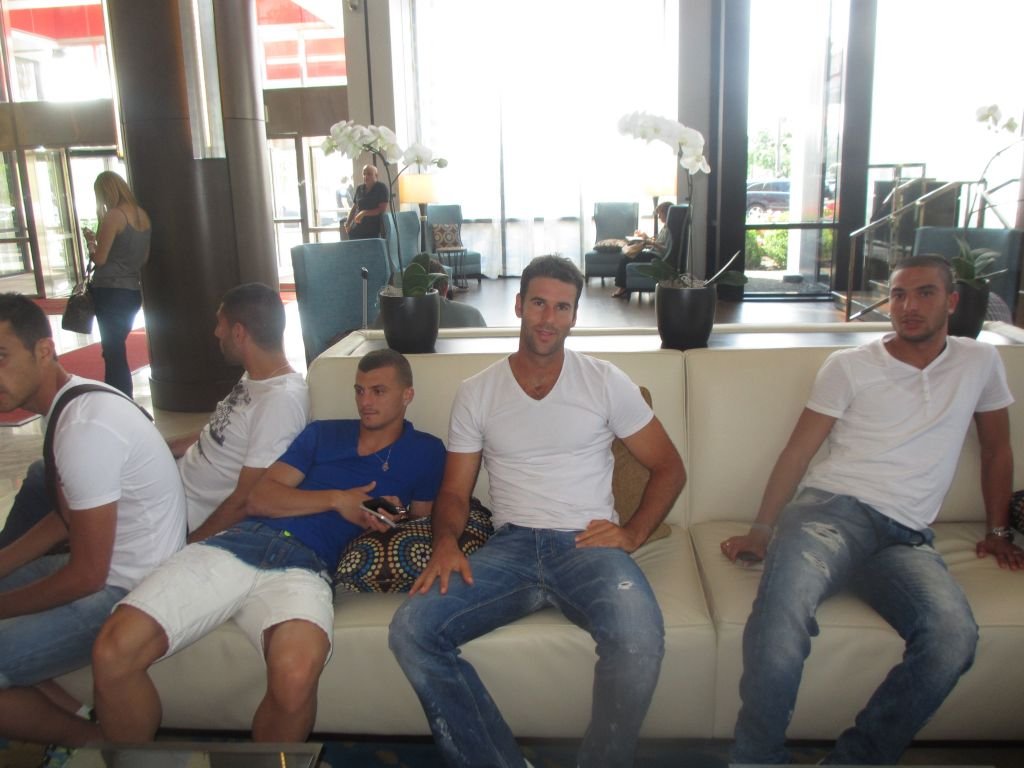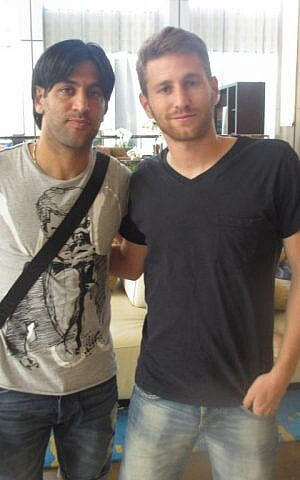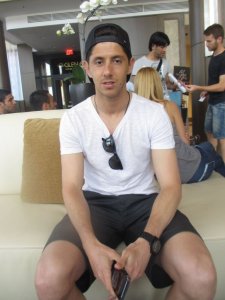World ranked 224, Israel’s Amir Weintraub ekes out a living playing World Team Tennis as a Boston Lobster. It helps pay the bills in the sport he loves.
BOSTON — Call it “tennis light,” “family-friendly tennis,” or perhaps, most importantly for players like Israel’s Amir Weintraub, call it “three weeks of tennis with a guaranteed paycheck.” Welcome to World Team Tennis.
For pro players like Weintraub, World Team Tennis is an opportunity for a few weeks’ steady income in a precarious field. Currently ranked 224th in the world, Weintraub ekes out a living playing such relatively minor events on the pro circuit, racking up points with the hope of making it to a major tournament.
World Team Tennis was co-founded in 1974 by tennis legend Billie Jean King (with former husband Larry King) and is based on a concept of gender equity. It consists of eight teams, which travel more than 60,000 miles to play 56 matches; this year’s season ran from July 7 to 24.
Weintraub and his Boston Lobsters finished its 2013 Mylan World Team Tennis season with 23 wins and 15 losses. Eastern and Western Conference Championships were held July 25, followed by the Mylan WTT Finals on July 28 where the Washington Kastles prevailed.
Unlike more conventional professional tennis matches, whose sets and matches can last several hours, WTT matches consist of just five games. Game scoring is no-ad; the first team to win four points wins the game. Tennis without deuces means matches last no more than 30 minutes — even with breaks for on-court dances by mascot Larry the Lobster, MC announcements and cheers (“OK Crustacean Nation-Turn up the Heat!”; “What time is it? Break Time!”), and even on-court player interviews.

During a brief opening night rain delay, the courtside announcer asked Weintraub such playful questions as his first concert (Scorpions), an instrument he’d like to play (guitar), breakfast today (Dunkin’ Donuts), the last concert he saw (Rihanna) and strangest gift ever received at a tennis tournament (a cape from Uzbekistan).
The Lobsters opened the 2013 season at their new home, the Joan Norton Tennis Center at the Manchester Athletic Club on Boston’s North Shore. Each night of the WTT season, fans were treated to men’s and women’s singles, men’s and women’s doubles and mixed doubles. The coach of the home team decided the order of events.
Weintraub represents the level of great athletes who hover around the top without quite breaking into the ranks of big prize money
In the first match of the evening, Weintraub, playing in his second WTT season, defeated Jesse Witten 5-2. Witten, playing in his sixth season with the Sportimes, reached a career high of 163 in singles and 274 in doubles. Weintraub and partner, Eric Butorac, closed out the evening with a 5-2 doubles win over Witten and Robert Kendrick (who reached a career high of 69 in 2009).
But even before Weintraub’s impressive opening night performance, Darlene Hayes, Chief Development Officer and General Manager of the Boston Lobsters, noted, “We are really excited to have Amir play with the Lobsters. He played WTT for the first time last season. We watched and were very impressed with how he played for the Springfield (Missouri) Lasers and for Israel’s Davis Cup. So we scooped him up!”
The good-natured, slim, 6 foot 2 inch (188 cm.) Weintraub, the only Israeli playing this season in the WTT, spoke with the Times of Israel prior to his first match with his new team. The Rehovot native was introduced to tennis at age six when his father, Luis, begin hitting balls with him in a parking lot. Luis also served as his designated driver, and was responsible for getting Amir to and from the Israel Tennis Centers in Jaffa, forty-five minutes each way.
Following a three-year stint at Israel’s Wingate Institute, Weintraub trained at a tennis academy in Vienna, Austria.
“It was hard being alone for two years,” recounted Weintraub, who was sixteen at the time. Upon returning to Israel, Weintraub qualified as an “outstanding athlete” and served the full three and a half years in the Israel Defense Forces. He continued to train at the Israel Tennis Centers in Ramat Hasharon and has been playing professionally since 2005.

Weintraub represents the level of great athletes who hover around the top without quite breaking into the ranks of big prize money. In January 2011, Weintraub even participated in the qualifiers of his first Grand Slam — the Australian Open — but he never made it into the main draw.
He has won several low-paying Israel Futures events, and he was a finalist in the 2011 Bangkok Challenger tournament. In 2012, Weintraub reached a career high ranking of 161. In 2013, he qualified for the main draw of the Australian Open, but lost in the qualifiers of Wimbledon.
Weintraub, now 26, constantly reflects on life “below 100” on the pro tour.
“The players below 100 are not less good, but less consistent than the top 100,” said Weintraub. “Every week, we travel somewhere else. I travel about 30 weeks a year. Because we have no relations with the Arab countries, there are no tournaments close to Israel. It’s a hard life.”
A post on weintraubamir.com entitled, “Waiting For an Offer from the Bundesliga,” begins, “If you’re not a top-100 tennis player, you’re doomed. Financially speaking, it will take you a few years to see that you are broke, you’ve spent all of your parents’ money and you’ll ask yourself why you haven’t pursued a football (soccer) career instead.” He explains why tennis leagues in Europe can be lucrative for tennis players, but Weintraub hasn’t played in these leagues. “You usually need a European passport to play in the European leagues.”
So Weintraub found himself in Boston, where it may sound ironic that a Jewish Israeli has been for three weeks, a “Lobster.”
“It is very intense. There are so many matches. And it is a tough format — you get few chances to come back.”
But, it helps pay the bills.
Following the Lobsters season and a series of tournaments, Weintraub is currently playing in Vancouver, where he has made it to the second round. He hopes to qualify for the US Open, which kicks off in late August. Then, it is off to Belgium where Weintraub joins teammates Dudi Sela, Jonathan Erlich, and Noam Okun for their September 12-15 Davis Cup matches. And finally, back on the road again —hoping to make a living doing what he knows and loves. Even as a Lobster.







